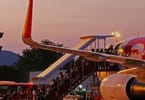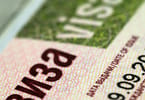DUBAI, United Arab Emirates – Just a year after the global downturn derailed Dubai’s explosive growth, the city is now so swamped in debt that it’s asking for a six-month reprieve on paying its bills — causing a drop on world markets Thursday and raising questions about Dubai’s reputation as a magnet for international investment.
The fallout came swiftly and was felt globally after Wednesday statement that Dubai’s main development engine, Dubai World, would ask creditors for a “standstill” on paying back its $60 billion debt until at least May. The company’s real estate arm, Nakheel — whose projects include the palm-shaped island in the Gulf — shoulders the bulk of money due to banks, investment houses and outside development contractors.
In total, the state-backed networks nicknamed Dubai Inc. are $80 billion in the red and the emirate needed a bailout earlier this year from its oil-rich neighbor Abu Dhabi, the capital of the United Arab Emirates.
Markets took the news badly — with the Dubai woes and the continued fall of the U.S. dollar giving investors twin worries. Dubai’s move raised concerns about debt across the Gulf Region. Prices to insure debt from Abu Dhabi, Qatar, Saudi Arabia and Bahrain all rose by double-digit percentages Thursday, according to data from CMA DataVision.
In Europe, the FTSE 100, Germany’s DAX and the CAC-40 in France opened sharply lower. Earlier in Asia, the Shanghai index sank 119.19 points, or 3.6 percent, in the biggest one-day fall since Aug. 31. Hong Kong’s Hang Seng shed 1.8 percent to 22,210.41.
Wall Street was closed for the Thanksgiving holiday and most markets in the Middle East were silent because of a major Islamic feast.
“Dubai’s standstill announcement … was vague and it remains difficult to discern whether the call for a standstill will be voluntary,” said a statement from the Eurasia Group, a Washington-based research group that assesses political and financial risk for foreign investors interested in Dubai.
“If it is not, Dubai World will be going into default and that will have more serious negative repercussions for Dubai’s sovereign debt, Dubai World and market confidence in the UAE in general,” the statement added.
Dubai became the Gulf’s biggest credit crunch victim a year ago. But its ruler, Sheik Mohammed bin Rashid Al-Maktoum, had continually dismissed concerns over the city-state’s liquidity and claims it overreached during the good times.
When asked about the debt, he confidently assured reporters in a rare meeting two months ago that “we are all right” and “we are not worried,” leaving details of a recovery plan — if such a plan exists — to everyone’s guess.
Then, earlier this month, he told Dubai’s critics to “shut up.”
“He needs to produce a recovery plan that will be respected by those who want to do business with Dubai,” said Simon Henderson, a Gulf and energy specialist at the Washington Institute for Near East Policy. “If he does not do it right, Dubai will be a sad place.”
After months of denial that the economic downturn even touched the glitzy city-state, the Dubai government earlier this year showed signs of trying to deal with the financial fallout that has halted dozens of projects and touched off an exodus of expatriate workers.
In February, it raised $10 billion in a hastily arranged bond sale to the United Arab Emirates central bank, which is based in Abu Dhabi.
The deal — seen by many as Abu Dhabi’s bailout of Dubai — was part of a $20 billion bond program to help Dubai meet its debt obligations.
On Wednesday, the Dubai Finance Department announced the emirate raised another $5 billion by selling bonds — all taken by two banks controlled by Abu Dhabi.
Abu Dhabi’s ruling Al Nahyan family has been more conservative with its spending, investing oil profits into infrastructure, culture and state institutions. During Dubai’s real estate bonanza, the Nahyans saw their flashy neighbor race ahead with development plans and tourism plans that had plenty of hype but few details on how they would be pulled off.
Some did materialize. The more than 2,600-foot (800-meter) Burj Dubai is scheduled to open in January as the world’s tallest building. But many other projects, including a tower even taller than the Burj Dubai and satellite cities in the desert, are still just blueprints.
The standstill will likely not immediately affect CityCenter, an $8.5 billion casino complex opening next month in Las Vegas that is half-owned by Dubai World. A Dubai World subsidiary and casino operator MGM Mirage agreed with banks in April to fully fund and finish the six-tower, 67-acre development of plush resorts, condominiums, a retail mall and one casino on the Las Vegas Strip.
However, the standstill’s effect may be felt on the famous Keeneland thoroughbred horse auctions near Lexington, Ky., where Sheik Mohammed is a prominent bidder.
Last week, Sheik Mohammed demoted several prominent members of Dubai’s corporate elite and replaced them with members of the ruling family, including his two sons, one of whom is Mohammed’s designated heir.
Businessmen who fell out of favor were closely associated with Dubai’s phenomenal success. They include the head of Dubai World, Sultan Ahmed bin Sulayem, and Mohammed Alabbar, the chief of Emaar Properties, developer of the Burj Dubai and hundreds of other projects.
“He is trying to shake things up,” said Christopher Davidson, a lecturer on the Gulf at Britain’s Durham University and an author of two books on the UAE.
However, Davidson added, Mohammed’s decision to replace those who helped put Dubai on the world map with his relatives might be “read as an increase in autocracy which does not look good internationally.”
Not everyone is upset at Dubai Inc.’s transformation into a family business, analysts say.
Mohammed’s latest moves may have pleased Abu Dhabi more than the foreign investors, but it is Abu Dhabi that still has the strongest incentives to save Dubai from its financial misery.
“By shifting the power base back to the family things are as they should be as far as Abu Dhabi is concerned,” said Mohammed Shakeel, a Dubai-based analyst for the Economist Intelligence Unit.
After an expensive adventure in doing things the Western way, it’s “going back to basics” for Dubai, Shakeel added.
ubai debt delay rattles investors
Property developer Nakheel was due to pay off nearly $3.5bn in bonds in December [EPA]
Debt problems in Dubai have shaken investors and put pressure on banking shares around the world as fears grow of a credit default.
European stocks fell to lows not seen since May and bonds jumped on Thursday after Dubai announced plans to restructure the debt of Dubai World, the state-owned conglomerate that has spearheaded the emirate’s growth.
“This is a default in everything but name,” Andrew Critchlow, managing director of Dow Jones Middle East, told Al Jazeera.
“No one expected this. People were expecting that Dubai was starting to climb out of its economic crisis and overcome the downturn we’ve seen globally.”
The cost of insuring Dubai’s debt surged on Thursday following the government’s announcement.
Dubai’s five-year credit default swaps – the insurance against its credit risk – rose to almost 470 basis points, a rise of 30 base points on the previous session’s close, CMA Datavision, a London-based market analysis group, said.
“Dubai isn’t doing risk appetite any favours at all and the markets remain in a vulnerable state of mind,” Russell Jones, the head of fixed-income and currency research in London at RBC Capital Markets, told Bloomberg.com.
“We’re still in an environment where we’re vulnerable to financial shocks of any sort and this is one of those,” he said.
Debt ‘standstill’
The government of Dubai said on Wednesday that it would ask Dubai World’s creditors to accept a moratorium on debt worth billions of dollars.
The move is part of a plan to restructure the state-run company and its property developer subsidiary Nakheel.
“Dubai World intends to ask all providers of financing to Dubai World and Nakheel to a ‘standstill’ and extend maturities until at least 30 May 2010,” a statement issued by the Dubai Financial Support Fund said.
Nakheel, the developer of the emirate’s palm-shaped residential islands, was due to pay off nearly $3.5bn in maturing Islamic bonds in December.
Nakheel is responsible for the construction of the artificial island of Palm Jumeriah [AFP]
Critchlow told Al Jazeera: “There were signs of a bounce-back in the property market. Trade and tourism were starting to bubble again.
“So this has surprised the entire business community and no one more than international banks who stand to potentially lose billions here.”
John Sfakianakis, chief economist at Saudi Fransi bank, said: “It might be a move to distinguish the solvent from less solvent companies in an attempt to shift the weight away from the less exposed entities.
“[But] that doesn’t entirely allay market concerns but it could signal the beginning of a restructuring and re-categorisation process.”
Dubai has external debts of around $80bn, of which Dubai World, one of the emirate’s biggest holding companies, owns around three quarters.
The emirate is now considered the sixth most likely government worldwide to default on its loans, according to CMA Datavision, putting it just below Latvia and Iceland.
“It appears Dubai World will be broken apart,” Critchlow said. “It is essentially two stories – the good and the bad – DP World on the one hand … and then its other subsidiaries.”
Restructuring priority
The Dubai government said on Thursday DP World, an international port operator, and its debt would not be part of the restructuring of Dubai World on Thursday.
Dubai World had been trying to persuade bank creditors to restructure up to $12bn of its loans.
The company, which owns Barneys New York, hired an advisory firm in August to help it explore options to shore up the US luxury chain’s financial position.
The emirate accumulated its debt as it expanded in the banking and real-estate sectors before the global financial crisis dried up available financing.
Restructuring its government-linked debts is now a top priority as the government seeks to assure a rebound for its trade, tourism and services-focused economy and recover from the precipitous property crash.
ZOMWE MUNGACHITE PA NKHANIYI:
- DUBAI, United Arab Emirates – Just a year after the global downturn derailed Dubai’s explosive growth, the city is now so swamped in debt that it’s asking for a six-month reprieve on paying its bills — causing a drop on world markets Thursday and raising questions about Dubai’s reputation as a magnet for international investment.
- After months of denial that the economic downturn even touched the glitzy city-state, the Dubai government earlier this year showed signs of trying to deal with the financial fallout that has halted dozens of projects and touched off an exodus of expatriate workers.
- are $80 billion in the red and the emirate needed a bailout earlier this year from its oil-rich neighbor Abu Dhabi, the capital of the United Arab Emirates.






















